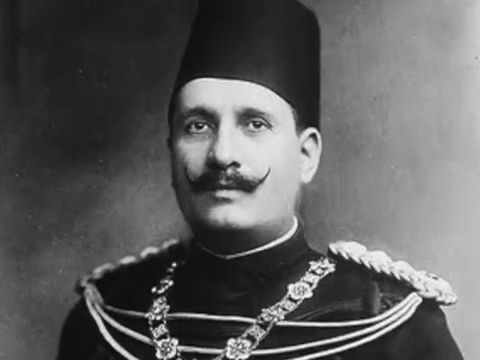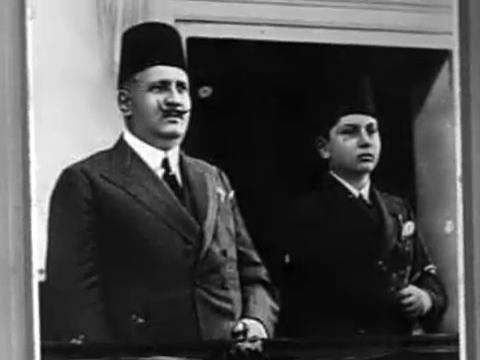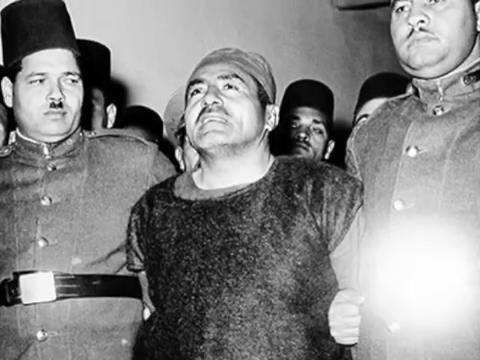Summary of the causes.
Egyptians desired full independence. They were sick of the white man's presence in their country.
 King Farouk's autocracy or
dictatorship led to the coup.
King Farouk's autocracy or
dictatorship led to the coup.
The desire to introduce parliamentary democracy led to the coup.
Farouk's government was inefficient and corrupt. The King, his relatives and friends (most of whom were palace officials) had great wealth and large chunks of land which they had obtained through dishonest /corrupt means.
The personality of King Farouk led to the coup. He was extravagant, weak and lacked political realism. He was an extremely Leisure loving King who spent most of his time on outings with his wife instead of concentrating on the affairs of the state.
The unfair land distribution also caused the coup/revolution. Most of the land was owned by the King, the royal family, his Wafd friends and some privileged class of Turkish origin.
 King Farouk practiced open
nepotism. All the key posts in the army and government were reserved for his
relatives.
King Farouk practiced open
nepotism. All the key posts in the army and government were reserved for his
relatives.
The emergence of the Muslim brother hood group also contributed to the revolution. This, and some other minor religious movements, aimed at purifying Islam and creating a purely Islamic government. Led by Sheikh Hassan Al-Banna, the Muslim brotherhood were unhappy with the growing immorality in Egypt.
The need to check against Christianity also contributed to the revolution. Ever since the British declared a protectorate over Egypt in 1914, Egyptians became grieved because according to the Quran, it was the role of Moslems to protect the infidels (Christians) and not vice versa.
There was a need to revive Egyptian culture. Egypt was the earliest African country to develop a classic culture and civilisation.
 Members of Moslem Brotherhood
Members of Moslem Brotherhood
King Farouk neglected public health in Egypt. Like other African countries, disease was one of the major problems faced by Egyptians between 1936-1952.
He also neglected education. The King did not allocate enough funds to improve the school education system of Egypt.
The unfair taxation system also led to the coup. Those who were best able to pay, such as the privileged Wafd party members and nobles paid very little. In addition, they were exempted from some forms of taxes. This left the heaviest tax burden on the shoulders of peasants.
The existing social inequalities contributed to the coup. Despite the fact that the whole world was turning away from class societies, in Egypt the King promoted such a society.
The domination of the Egypt economy by foreigners also led to the coup. Most of the profitable business firms in Egypt were in the hands of foreigners.
The King neglected Egypt's industrial sector. Before colonial rule, Egyptians had tried to develop local capacity and industrialization had begun.
Grievances in the army also contributed to the coup. King Farouk did not bother to motivate the Egyptian soldiers.
Farouk undermined the status of women in Egypt. The King had little regard for women whom he took to be inferior to men. He put no programmes in place to improve their situation.
The King persecuted his critics. When the Muslim brotherhood became radical and militant in their demand for reform. King Farouk ordered for their arrest and imprisonment.
The formation of the free officers' movement also explains the occurrence of the coup. This was a movement of young, modern and radical soldiers.
Failure by Farouk to make Egypt a leader of African and Arab Unity. The King followed a policy of cautious isolation from Arab and African politics.
The defeat of Egypt during the 1948/49 Palestinian war also led to the down fall of Farouk. The war was between the infant nation of Israel and the Arab states led by Egypt.
The outbreak of the World War also contributed o the revolution. During the war, Egypt became a battlefield between the axis powers and allied powers. The war left the Egyptian economy in shambles.
The use of violence in an attempt to expel the British led to Farouk's downfall. In 1951, the Muslim brotherhood launched a guerrilla war against the British in Suez Canal zone.
The January and July arrest of nationalists also contributed to the coup. After the disastrous Palestinian War, the free officers secretly met and planned to overthrow Farouk in 1954.
Nasser's personal ambition for power also contributed to the coup. Since his school days he had planned to lead the country. Now that he was a colonel in the army, Farouk's days were numbered.
King Faud (1918-1936) also contributed to the coup. He had been equally dictatorial and had made no reforms in the monarchy. His young son and successor-Farouk just continued his fathers policies.
The 2nd World War was responsible for massive unemployment, deaths, casualties, inflation etc. Unfortunately all this was blamed on Farouk.
At secondary school Nasser developed an advanced political consciousness. In 1935 he wrote to a friend: 'Where is dignity? Where is nationalism? Where is what one can call the activity of youth? It has all disappeared and the nation lies asleep like the inhabitants of a cave.' In 1935 and 1936 Nasser was involved in student demonstrations and clashes with the Egyptian and British police.
After a period studying law in Cairo University, Nasser entered the Military Academy in 1937. The army proved to be the vehicle by which Nasser, Sadat and other Free Officers restored Egypt's dignity and brought its people out of the darkness of the neo-colonial cave and into the broad daylight of self-reliance. After the Second World War Nasser took the lead in developing the cell organization of the Free Officer movement.
He emphasized socialist education and opposed assassination as a revolutionary method. After the Palestine War Nasser formed the executive committee of the Council of the Revolution. The committee planned a military coup for the years 1954 and 1955, but when the cell organization was penetrated by Farouk's police in 1952 the revolution was brought forward in order to forestall the arrest of the Free Officers.
An almost bloodless coup (only two people were killed) was carried out on the night of 22-23 July 1952, as key military bases, government buildings and communications centres were taken over by units led by Free Officers. King Farouk abdicated and sailed away in his luxury yacht to begin a comfortable exile in Western Europe. Nasser pushed forward as new Head of State a brave, popular and moderately progressive senior officer, the genial and pipe-smoking Major-General Neguib, who would give respectability to the new regime both at home and abroad.
Neguib was removed from the presidency in November 1954 for supporting a return of the army to barracks and the restoration of political parties and elections. The army wanted revolution not sham democracy. Nasser became President and Prime Minister.
National Movements and New States in Africa